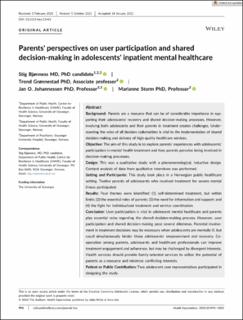| dc.contributor.author | Bjønness, Stig Erlend | |
| dc.contributor.author | Grønnestad, Trond Erik | |
| dc.contributor.author | Johannessen, Jan Olav | |
| dc.contributor.author | Storm, Marianne | |
| dc.date.accessioned | 2023-03-14T12:34:01Z | |
| dc.date.available | 2023-03-14T12:34:01Z | |
| dc.date.created | 2022-02-08T08:30:14Z | |
| dc.date.issued | 2022 | |
| dc.identifier.citation | Bjønness, S., Grønnestad, T., Johannessen, J. O., & Storm, M. (2022). Parents' perspectives on user participation and shared decision‐making in adolescents' inpatient mental healthcare. Health Expectations, 25(3), 994-1003. | en_US |
| dc.identifier.issn | 1369-6513 | |
| dc.identifier.uri | https://hdl.handle.net/11250/3058157 | |
| dc.description.abstract | Background
Parents are a resource that can be of considerable importance in supporting their adolescents' recovery and shared decision-making processes. However, involving both adolescents and their parents in treatment creates challenges. Understanding the roles of all decision stakeholders is vital to the implementation of shared decision-making and delivery of high-quality healthcare services.
Objective
The aim of this study is to explore parents' experiences with adolescents' participation in mental health treatment and how parents perceive being involved in decision-making processes.
Design
This was a qualitative study with a phenomenological, inductive design. Content analysis of data from qualitative interviews was performed.
Setting and Participants
This study took place in a Norwegian public healthcare setting. Twelve parents of adolescents who received treatment for severe mental illness participated.
Results
Four themes were identified: (1) self-determined treatment, but within limits; (2) the essential roles of parents; (3) the need for information and support; and (4) the fight for individualized treatment and service coordination.
Conclusion
User participation is vital in adolescent mental healthcare and parents play essential roles regarding the shared decision-making process. However, user participation and shared decision-making pose several dilemmas. Parental involvement in treatment decisions may be necessary when adolescents are mentally ill, but could simultaneously hinder those adolescents' empowerment and recovery. Cooperation among parents, adolescents and healthcare professionals can improve treatment engagement and adherence, but may be challenged by divergent interests. Health services should provide family-oriented services to utilize the potential of parents as a resource and minimize conflicting interests.
Patient or Public Contribution
Two adolescent user representatives participated in designing the study. | en_US |
| dc.language.iso | eng | en_US |
| dc.publisher | Wiley | en_US |
| dc.rights | Navngivelse 4.0 Internasjonal | * |
| dc.rights.uri | http://creativecommons.org/licenses/by/4.0/deed.no | * |
| dc.title | Parents' perspectives on user participation and shared decision‐making in adolescents' inpatient mental healthcare | en_US |
| dc.title.alternative | Parents' perspectives on user participation and shared decision‐making in adolescents' inpatient mental healthcare | en_US |
| dc.type | Peer reviewed | en_US |
| dc.type | Journal article | en_US |
| dc.description.version | publishedVersion | en_US |
| dc.rights.holder | The authors | en_US |
| dc.subject.nsi | VDP::Samfunnsvitenskap: 200::Psykologi: 260 | en_US |
| dc.subject.nsi | VDP::Medisinske Fag: 700 | en_US |
| dc.source.journal | Health Expectations | en_US |
| dc.identifier.doi | 10.1111/hex.13443 | |
| dc.identifier.cristin | 1998849 | |
| cristin.ispublished | true | |
| cristin.fulltext | original | |
| cristin.qualitycode | 1 | |

